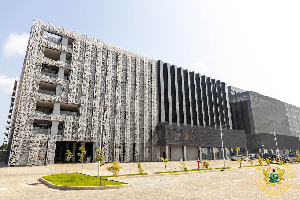Chief Eecutive of Ghana Free Zones Board, Michael Okyere Baafi, has outlined aggressive initiatives to create new Ghanaian billionaires through the free zones arrangement.
He said aside the attractive incentives, the board is prepared to give local investors, who accept to operate export-oriented businesses under Free Zones all the support they need, including stimulus packages as well as identifying markets for them.
“The board is ready and willing to support Ghanaians interested in export oriented business,” he said.
He explained that the board has already started identifying Ghanaians with the capacity to operate export-oriented businesses, held discussions with 12 people who have all expressed interest.
“We want to identify Ghanaians, who are capable, who have the money, who have the excess funds to invest.
“In the immediate term, the board targets to build at least 10 champions in business.” he said.
$2.3bn exports in 2016
While capital invested for 2016 amount to some $270.72 million, value of export hits $2.3 billion
Past efforts concentrated on foreign investors
Speaking to The Finder on the sidelines of a media interaction, Baafi observed that, over the years, the board had over concentrated efforts on attracting foreign investors at the expense of local investors.
“This is a problem because if care is not taken, a time will come when the foreign direct investors, come, invest and build huge businesses.
“When the investors want to exit, we may not have Ghanaians who have the capacity to acquire such businesses,” he added.
Consequently, he emphasised the urgent need to empower local investors alongside growing foreign investments so that the local investors would have the muscles to be able to acquire businesses later and also be big boys in industry.
“We should be able to encourage local entrepreneurs, local investors, local business people to be interested in export-oriented businesses so that when we build them and they become so strong, they will be able to create a lot of employment for the jobless,” he stated.
One District, One Factory and Free Zones
According to Baafi, Free Zones Board wants to be an avenue to champion government’s flagship One District, One Factory policy.
“We are saying that most Ghanaians are interested in doing normal investments but we want to push a lot of them to invest in export-oriented business so that they will be able to export a sizeable number of their products to make foreign exchange.
“When we get more foreign exchange, we will be able to enhance our economy and resolve balance of payment challenges,” he added.
Baafi noted that not paying corporate taxes of 25% for 10 years under the Free Zones is a huge incentive as the money saved can be ploughed back into the business to expand.
He announced that the target of the new management is to grow by 25% minimum and 30% maximum within a matter of six months.
This, he explained, is based on timelines driven by targeted investment attraction instead of wholesale approach, such as attending investment fora and missions.
He is convinced that the Ghanaian wants to do business and make money which is the essence of doing business.
By so doing, he said the Ghanaian investor would create employment and make return on investment as Free Zones is the best way to achieve such noble goals.
The incentives serve as motivator and boaster for business and Free Zones can propel such businesses to a different level.
Rationale behind Free Zones.
Since its inception, a lot of progress has been made in attracting both local and foreign investors who produce goods and services for export.
Export 70% of products.
Investors are allowed to export all goods and services produced (100%) or export not less than 70% and sell not more than 30% locally.
The main idea of establishing the Free Zones is to develop Ghana into a hub for manufacturing and processing through value addition for export.
The Free Zones Programme focuses on development through exports to encourage investors to produce goods and services for export-oriented development.
Through this, Ghana can, gradually, move away from an exporter of raw materials to an exporter of value added goods and services to enable her to compete keenly with other emerging economies and entrench our position in the global marketplace.
Much as the government is striving to revamp local industries to boost manufacturing for both local and export markets, it is important for individuals and groups to take advantage of the Public-Private Partnership framework to produce more goods and services to feed Ghanaians and to export.
Incentives for Free Zones companies
The extensive and generous incentives, packaged in the Free Zone Act (1995), for investors interested in developing and operating free zone enclaves and single-factory free zones in Ghana include:
• 100% exemption from payment of direct and indirect duties and levies on all imports for production and exports from free Zones;
• 100% exemption from payment of income tax on profits for 10 years and shall not exceed 8 percent thereafter;
• Total exemption from payment of withholding taxes from dividends arising out of free zone investments;
• Relief from double taxation for foreign investors and employees;
• No import licensing requirements;
• Minimal customs formalities;
• 100% ownership of shares by any investor ?foreign or national ?in a free zone enterprise is allowed;
• There are no conditions or restrictions on: repatriation of dividends or note profit; payments for foreign loan servicing; payments of fees and charges for technology transfer agreements; and remittance of proceeds from sale of any interest in a free zone investment;
• Free Zone investors are permitted to operate foreign currency accounts with banks in Ghana ;
• At least 70% of annual production of goods and services of Free Zone Enterprises must be exported; consequently up to 30% of annual production of goods and services of a free zone enterprise are authorised for sale in the local market
• Free Zone investments are guaranteed against nationalisation and expropriation.
Business News of Monday, 10 July 2017
Source: thefinderonline.com













